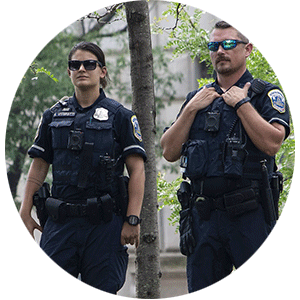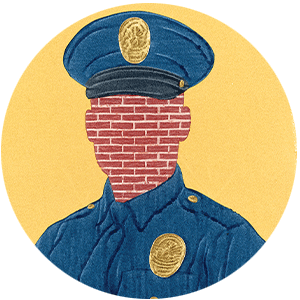Table of Contents |
 Ethics and professionalism are more important than ever for modern policing. Police officers have considerable authority and responsibility, including the power to:
Ethics and professionalism are more important than ever for modern policing. Police officers have considerable authority and responsibility, including the power to:
Ethics often refers to the moral principles that guide behavior and decision making. In policing, ethics is about ensuring that officers perform their duties while respecting the rights and dignity of everyone as they uphold the law. Ethical policing is necessary to build trust between police and communities.
Several ethical principles are necessary in policing, guiding officers in their interactions with the public (College of Policing, 2024):
| Principle | Description |
|---|---|
| Integrity | Police officers must act with honesty and integrity, adhering to the law and moral principles in all situations. Integrity requires officers to be truthful, transparent, and fair, even when faced with difficult decisions. |
| Impartiality and Fairness | Ethical policing requires treating everyone equally, regardless of race, gender, socioeconomic status, or other personal characteristics. Officers must enforce the law impartially, without bias, ensuring that justice is applied fairly. |
| Respect for Rights and Dignity | Police officers are tasked with protecting our rights, including the right to life, liberty, and property. Ethical policing demands that officers respect the dignity and humanity of all people, even those accused of crimes. |
| Accountability | Ethical officers take responsibility for their actions and decisions. When mistakes are made, they should be acknowledged, and steps should be taken to rectify them. Accountability also extends to holding other officers accountable for misconduct. |
| Duty and Responsibility | Officers have a duty to serve the public and uphold the law. Ethical policing involves a commitment to fulfilling this duty to the best of one’s abilities, even in challenging or dangerous situations. |
Most law enforcement agencies adopt a code of ethics that outlines the expectations for professional conduct. The Law Enforcement Code of Ethics, established by the International Association of Chiefs of Police (IACP), serves as a guiding document for police officers in the U.S. (International Association of Chiefs of Police, 1957).
Professionalism in policing is linked to ethical behavior and refers to the skills, attitudes, and conduct that portray competent and responsible police work. Professionalism involves:
| Element | Description |
|---|---|
| Competence and Training | Professional officers must be well trained and capable of handling a wide range of situations, from routine traffic stops to criminal investigations. Continuous training is needed to stay current with laws and policing technologies. |
| Communication and Interpersonal Skills | Professionalism requires strong communication skills, both verbal and nonverbal. Officers must be able to interact effectively with people from diverse backgrounds, resolve conflicts, and de-escalate volatile situations. |
| Appearance and Behavior | Officers are seen as representatives of the law and their departments. Professionalism includes maintaining a professional appearance and behaving in a way that reflects positively on the force. |
| Commitment to Public Service | Professional officers are motivated by a commitment to serving the community and protecting public safety. They prioritize the well-being of the public over personal interests or convenience. |
| Ethical Decision Making | Professionalism involves making decisions that are legally sound and ethically responsible. Officers must be able to weigh the consequences of their actions and make choices that uphold the principles of justice. |
Police culture plays a considerable role in shaping the behavior of officers. While police departments often promote ethical behavior and professionalism through formal policies and training, the informal norms and values of police culture can either support or undermine these efforts.
Police culture often reinforces positive values like loyalty and commitment to public safety. Officers form close bonds with their coworkers, and this sense of camaraderie helps them cope with the challenges and stresses of the job (Highlights, 2019). Police culture can also promote accountability and integrity by encouraging officers to act as role models for one another and to intervene when they witness misconduct. 
However, there are also negative aspects of police culture that can undermine ethics and professionalism. One of the most troubling is the "code of silence" or "blue wall of silence," where officers may be reluctant to report the misconduct of their colleagues out of fear of retaliation or loyalty to their peers (Westmarland & Conway, 2020). This can perpetuate unethical behavior and prevent accountability.
Furthermore, some officers may develop an “us versus them” mentality (Boivin et al., 2020), which is a negative mindset toward the public, viewing people as potential threats or enemies. This can lead to aggressive policing, dehumanization of suspects, and a disregard for individual rights. Lastly, some departments tolerate unethical behavior or even encourage it as part of the job. Officers may feel pressure to meet certain quotas for arrests or citations, leading them to engage in questionable practices (Westmarland & Conway, 2020).
Police departments must adopt strategies that promote ethical behavior and professionalism at both the individual and organizational levels. They can do this by improving training, strengthening accountability, and fostering a positive police culture.
Ethical training is a necessary component of police education and professional development (Reamer, 2019).
EXAMPLE
Officers need regular, scenario-based training on how to handle ethical dilemmas, as well as instruction on de-escalation techniques, cultural competency, and reducing bias.Incorporating ethics training into the police academy curriculum can help officers develop a strong moral foundation from the beginning of their careers. Ongoing education can reinforce these principles throughout an officer’s career, especially for those in supervisory roles.
Accountability is also essential to ensure that ethical standards are upheld. This can be achieved through internal disciplinary processes, external oversight, and community involvement. Departments should have strong internal affairs units that investigate allegations of misconduct and ensure that officers are held accountable for unethical behavior. Moreover, external oversight, such as civilian review boards, allow community members to review police conduct and make recommendations for improvement (Raffish, 2021). This transparency in how complaints, investigations, and disciplinary actions are handled can build public trust and encourage officers to adhere to ethical standards.
Lastly, changing police culture to emphasize ethics and professionalism requires long-term commitment and leadership (Rodriguez, 2021). Departments must prioritize integrity, transparency, and community engagement in their mission statements and daily operations. They should also create safe ways for officers to report misconduct without fear of retaliation. It is important for officers who expose unethical behavior to be protected and supported by their departments. Departments can also encourage ethical policing by publicly recognizing and rewarding officers who demonstrate integrity, fairness, and professionalism.
Source: THIS TUTORIAL WAS AUTHORED BY SOPHIA LEARNING. PLEASE SEE OUR TERMS OF USE
REFERENCES
Boivin, R., Faubert, C., Gendron, A., & Poulin, B. (2020). The ‘us vs them’ mentality: A comparison of police cadets at different stages of their training. Police Practice & Research: An International Journal, 21(1), 49–61.
College Of Policing. (2024, January 24). Guidance for ethical and professional behaviour in policing. College of Policing. www.college.police.uk/ethics/code-of-ethics/guidance
Highlights: Improving police culture in America. (2019). Brookings. www.brookings.edu/articles/highlights-improving-police-culture-in-america/
International Association of Chiefs of Police. (1957, October). Law enforcement code of ethics. Theiacp.org. www.theiacp.org/resources/law-enforcement-code-of-ethics
Raffish, B. (2021, February 17). Civilian Oversight as a Police Accountability Mechanism. Default. www.lawfaremedia.org/article/civilian-oversight-police-accountability-mechanism
Reamer, F. (2019). Policechiefmagazine.org. www.policechiefmagazine.org/teaching-ethics-in-the-training-academy/
Rodriguez, I. (2021, January 28). Changing Police Culture Requires Transparent Rules, Says Task Force. The Crime Report. thecrimereport.org/2021/01/28/change-in-police-culture-requires-transparent-rules-says-task-force/
Westmarland, L., & Conway, S. (2020). Police ethics and integrity: Keeping the ‘blue code’ of silence. Policing: A Journal of Policy and Practice, 22(4). https://journals.sagepub.com/doi/10.1177/1461355720947762